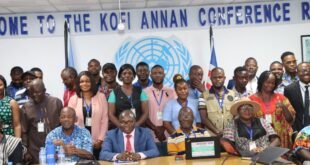The National Commission on Higher Education announces plans to audit the academic credentials of university lecturers and administrators in the country to weed out quacks.
By Kruah Thompson
Monrovia, Liberia, July 10, 2024 –Quack PhD and master’s degree holders are parading the corridors of universities and colleges in the country, and lecturers are worried as the National Commission on Higher Education (NCHE) here announces plans to audit the academic credentials of faculty members of higher education institutions in Liberia.
The evaluation will commence soon, beginning at the University of Liberia, followed by Cuttington University and all other higher learning institutions here.
Speaking at the Ministry of Information, Culture Affairs, and Tourism’s regular press briefing on Tuesday, July 9, 2024, the Director General of the National Commission on Higher Education (NCHE), Dr. Edward Lama Wonkeryor, revealed that during the Weah administration, a proposal concerning this matter was submitted to the Ministry of Finance.
He says upon receiving an invitation, former Finance Minister Samuel Tweh, requested a proposal to secure funding for the initiative.
However, Dr. Wonkeryor explains that after the request was received by the former minister, he (Dr. Wonkeryor) and his team worked diligently to submit all required documents. But, despite their efforts, the requested funding of two hundred sixty-thousand was never allocated.
He underscores President Boakai’s administration has renewed interest in higher education by increasing the Higher Education Commission’s budget from four hundred thousand to over one million United States Dollars.
“With these resources at our disposal, the NCHE is now implementing mechanisms to carry out the credential verification process effectively. We plan to launch the evaluation soon, beginning with the University of Liberia, Cuttington University, and other institutions fully funded by taxpayers.” He reveals.
According to him, the primary objective is to verify the credentials of faculty and educators who claim academic degrees they do not possess.
He stresses the importance of removing fake degrees from Liberian universities to ensure quality education that can compete regionally.
He assures that the NCHE will execute the President’s mandate without bias, using the available resources effectively.
“Any individual found misrepresenting their academic qualifications will face consequences, including potential legal action”, he warns.
Additionally, Dr. Wonkeryor revealed that the Commission is working to convene a stakeholders’ conference involving all higher learning institutions, including colleges and universities, to standardize curricula.
This conference aims to unite institution heads, policymakers, and government officials to discuss higher education dimensions and effectively synchronize curricula.
He says there are discussions with ECOWAS leaders and member countries to standardize curricula across the sub-region.
Moreover, he announced the successful standardization of health sciences curricula in the region and plans to present this to the heads of state for approval.
He says harmonizing curricula from different institutions aims to facilitate seamless course transfers between universities.
“If a student completes courses at the University of Liberia and seeks transfer to a different university, the requirements that the student has fulfilled should not be disregarded.”
The National Commission on Higher Education (NCHE) regulates and accredits higher education programs in Liberia.
Established by an Act of the National Legislature in 1989, the NCHE is mandated to regulate, manage, and monitor higher education activities nationwide.
Currently, the Commission recognizes 80 higher education institutions (HEIs), which are grouped into three (3) categories by credentials, including a) two (2) Doctoral Degree-granting institutions, b) Eleven (11) Master’s Degree-granting institutions, c) Thirty-Five (35) Bachelor’s Degree-granting institutions, and d) Thirty-One (31) Associate’s Degree-granting institutions.
The institutions are further classified by their ownership into Thirteen (13) public, Thirty-Two (32) private, and Thirty-Five (35) faith-based. These institutions are distributed across 11 counties in Liberia, including Bomi, Bong, Grand Bassa, Grand Gedeh, Grand Kru, Lofa, Margibi, Maryland, Montserrado, Nimba, and Sinoe Counties.
The 2022/2023 higher education management information statistics (HEMIS) put the student enrollment in higher education at 59,854, including 31,877 males and 27,987 females in all sector levels. Editing by Jonathan Browne
 JamzNG Latest News, Gist, Entertainment in Nigeria
JamzNG Latest News, Gist, Entertainment in Nigeria









